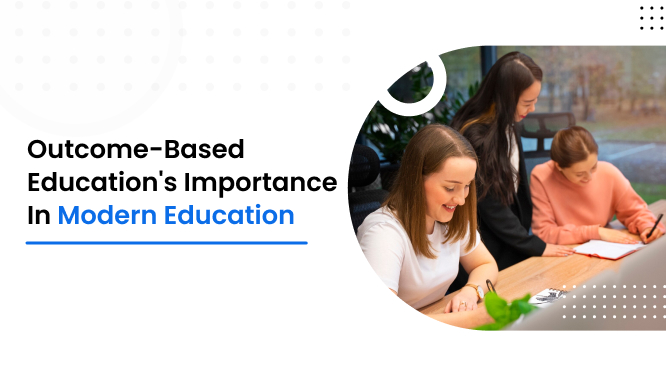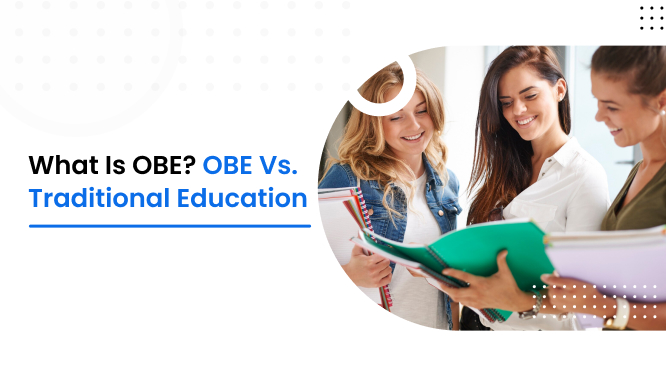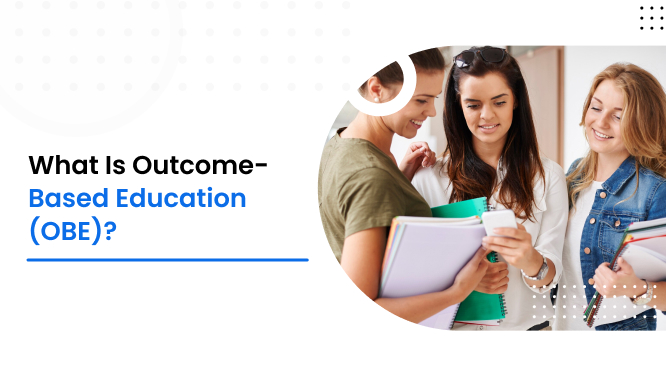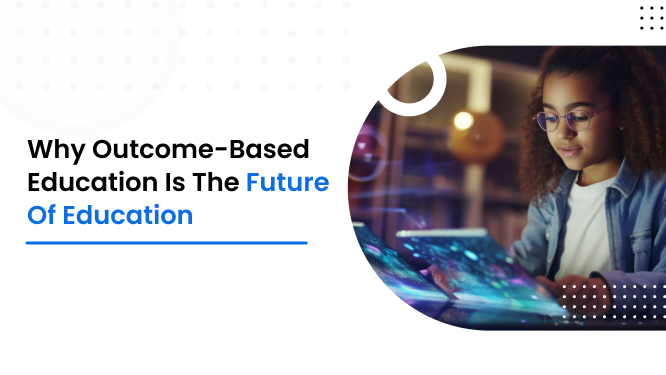
Recent Blogs
Why Outcome-Based Education is the Future of Education
Youth today need more than traditional education to keep up with the challenging demands of the world. This is where Outcome-Based Education (OBE) emerges as a transformative approach that promises to reshape how we prepare students, the youth, for the challenges of the future.
Unlike traditional methods that focus solely on delivering content and information, OBE shifts the spotlight to the actual outcomes of learning.
Let's take a deeper look into why Outcome Based Education is gaining momentum and how it can revolutionise education.
Understanding Outcome Based Education
As the name suggests, Outcome Based Education, at its core, focuses on clear and measurable goals or outcomes.
Instead of focusing on how teachers deliver content to the student, in OBE, they emphasise an outcome-oriented instructional approach.
In OBE students learn and develop themselves to achieve a specific outcome by the end of their educational journey.
These outcomes of OBE are wider than how much knowledge can be acquired by the students. They include the skills and competencies to have been developed, along with practical application of the knowledge in real life.
Think of it as an engineering student who has mastered calculus and also applied the knowledge to engineering problems and design algorithms
One tool that goes hand in hand in implementing OBE is the Learning Management System. Let’s take a look at
The Role of Learning Management Systems (LMS)
Learning Management Systems (LMS) serve as the digital backbone of Outcome Based Education (OBE). It provides teachers and students with a well-organised e-learning platform for content delivery, assessment, and progress tracking.
Simply speaking, LMS is like the engine room where the educational journey takes shape.
LMS platforms simplify the learning process, whether it's through e-learning with online courses, blended learning setups, or competency-based curricula.
They offer personalised learning paths, interactive modules, and instant feedback. This empowers students to actively take the lead in their learning journey.
With that done, we come to the main focus of this article.
Why Outcome-Based Education is the Future of Education
Outcome-Based Education (OBE) isn't just a passing trend; it's the way forward for education, and here's why OBE) is considered the future of education:
Focus on Real Skills
Outcome Based Education shifts the focus from how we teach to what students actually learn.
It's about ensuring that at the end of the course or program, students gain not just theoretical knowledge, but practical skills as well which they can apply in real-world situations.
Meeting Job Market Needs
OBE ensures that educational programs stays relevant to what employers are looking for in today's competitive job market.
By aligning curriculum with industry demands, students graduate with the specific skills and competencies that employers value most.
This helps bridge the gap between education and employment, increasing opportunities for successful career paths.
Getting Students Involved
Active learning and engagement by encouraging students to take an active role in their education is also promoted by outcome-based education.
Rather than passively receiving information, students are encouraged to participate in discussions, collaborate with peers, and apply concepts in real-world scenarios.
This develops a deeper understanding of the material and cultivates critical thinking and problem-solving skills.
Balancing Personal and Standardised Learning
Outcome Based Education maintains a balance between personalised learning experiences and standardised outcomes.
While allowing flexibility for individual learning styles and needs, it also sets clear learning objectives and performance standards.
This ensures consistency and quality across educational programs while still accommodating diverse student populations and learning environments.
Fits Everywhere
One of the strengths of OBE is its adaptability to various educational settings and levels, from primary school to higher education.
Regardless of the subject or discipline, teachers can apply OBE principles to design curricula to meet the learners needs at different stages of their academic journey.
This versatility makes OBE a valuable framework for teachers and institutions seeking to enhance teaching and learning.
Keeping Quality in Check
By setting clear goals and learning outcomes, OBE serves as a tool for continuous improvement and quality assurance in educational institutions.
It provides a framework for assessing student progress, evaluating teaching effectiveness, and identifying areas for enhancement.
This ongoing process of evaluation and refinement helps ensure that students receive a high-quality education that prepares them for success in the future.
So this is why outcome based education is important.
But what is its impact on student's learning and future?
The Impact of OBE on Student Success
Research backs up the effectiveness of Outcome Based Education on student success.
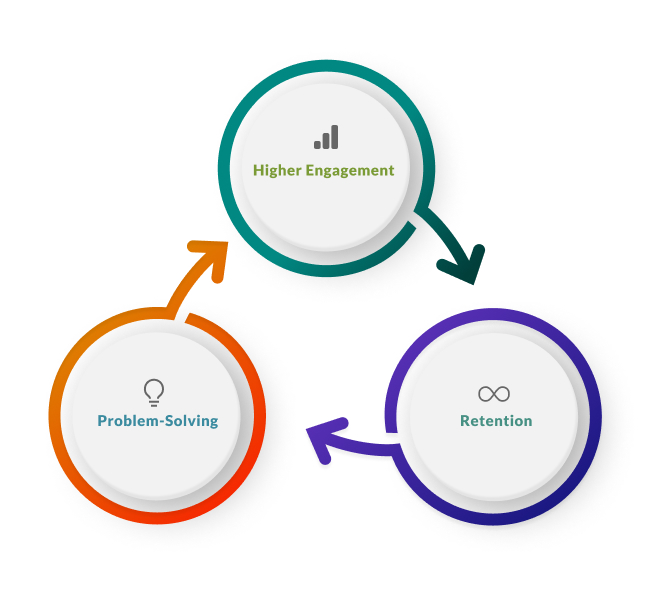
Higher Engagement
When students understand the relevance of what they're learning and apply it in real life, they're more likely to be engaged and motivated. Outcome-Based Education (OBE) does just that by connecting classroom learning to real-life situations and personal goals.
For example, when students see how algebra can help them solve everyday problems or pursue their career aspirations, they're more eager to participate and learn.
This sense of purpose develops curiosity and a feeling of ownership over their education, leading to higher levels of engagement and enthusiasm in the classroom.
Retention
We've all experienced the frustration of cramming for a test only to forget the information shortly afterwards. Research shows that learners retain knowledge better when they actively apply it.
OBE takes this into account by emphasising the practical application of concepts and skills.
Instead of just memorising facts or formulas, students are encouraged to use them in real-world scenarios, strengthening their understanding and making the learning experience more meaningful.
For instance, in a science class, conducting experiments or solving problems related to everyday phenomena not only deepens students' understanding but also helps them remember the concepts long-term.
Problem-Solving
Success, in today’s world, often depends on the ability to think critically and solve complex problems. OBE goes beyond memorisation to cultivate these essential skills.
By encouraging students to analyse, synthesise, and innovate, OBE prepares graduates to face real-world challenges with confidence and creativity.
For example, in a project-based learning environment, students may collaborate to tackle open-ended problems or design solutions to real community issues.
This hands-on approach not only reinforces learning but also equips students with the critical thinking skills needed to thrive in diverse personal and professional contexts.
The Role of Mastersoft's Educational Solutions
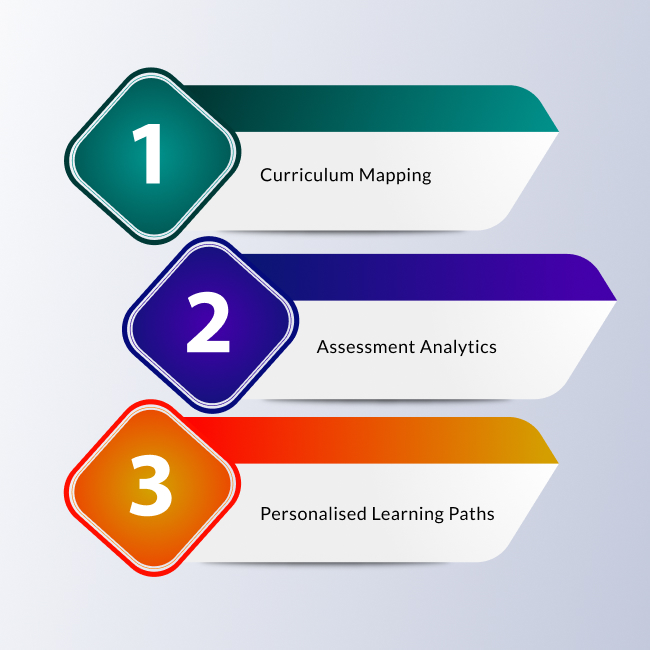
Mastersoft, a leading provider of educational solutions, is at the forefront of driving forward Outcome Based Education (OBE). Their innovative tools and platforms play a crucial role in bringing OBE to life.
Here's how Mastersoft makes a difference:
Curriculum Mapping:
Mastersoft’s software makes life easier for teachers by helping them match learning outcomes with specific courses. This ensures that what students are learning lines up perfectly with the overall goals of the program.
Assessment Analytics
With Mastersoft's help, teachers can dive deep into student performance data. By analysing this information, they can pinpoint areas where students might need extra support and adjust their teaching strategies accordingly.
Personalised Learning Paths
Mastersoft's adaptive learning systems are like having a personal tutor for each student. These systems deliver content in a way that's tailored to each student's unique needs and learning style.
This not only keeps students engaged but also helps them achieve their full potential."
On The End Note
Outcome-based education isn't just a distant dream—it's already changing the game in classrooms, whether they're physical or virtual.
As we dive into this new way of thinking, let's keep one thing in mind: education isn't just about what we teach; it's about what students learn and how they use that knowledge.
With OBE, education stays relevant to the real world, equipping learners with the skills they need to succeed in an ever-evolving landscape. It's not just about passing exams; it's about preparing students to thrive in whatever challenges come their way.
